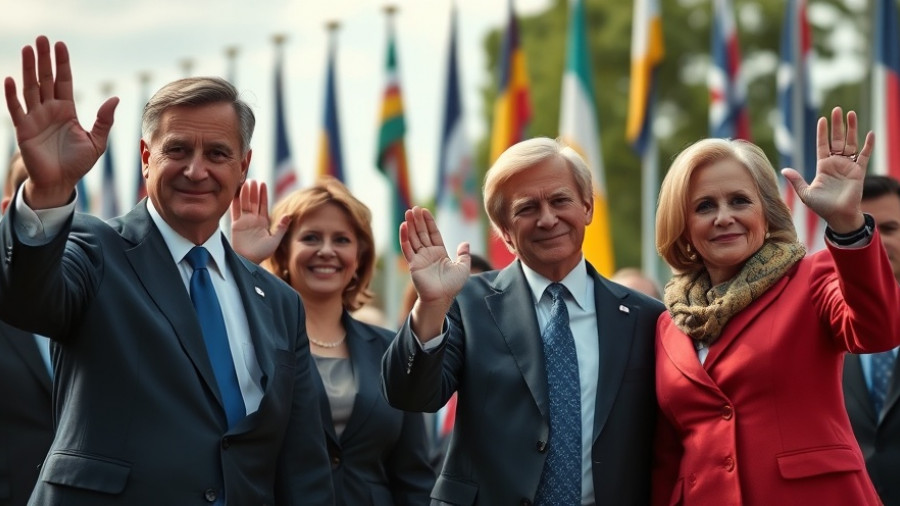
Understanding the Stakes: Zelenskyy, Trump, and the Ukrainian War
The recent encounter between Ukrainian President Volodymyr Zelenskyy and former U.S. President Donald Trump highlights an ongoing quest for peace amid one of the most pressing geopolitical crises of our time—Russia’s ongoing war against Ukraine. During their discussions, the focus turned to the potential deployment of Tomahawk missiles, a pivotal element in the U.S. defense strategy that could significantly alter the dynamics of the conflict. This meeting represents the complexities of international relations where the physical stakes often intertwine with stringent political narratives.
In 'Zelenskyy Meets Trump: Pushes for Tomahawk Missiles in New Defence Deal', the conversation around military strategy and peace negotiations brings forth key insights that warrant deeper analysis on our end.
The Human Cost of War: A Shared Understanding
In a press interaction following their meeting, both leaders underscored the urgent need to prioritize human life over abstract discussions of conflict. Zelenskyy poignantly addressed the necessity for the American populace and their leaders to comprehend the real, often tragic human cost of war. His emphasis on empathy and mutual understanding resonates deeply, reminding policymakers that decisions made in distant capitals affect real lives on the ground.
Recalling Past Successes: Can History Repeat Itself?
Trump’s claims of having mediated in eight international conflicts, including the Middle East, subtly positioned him as a potential peacemaker for the ongoing war in Ukraine. His statements evoke curiosity: Can the strategies used in these past negotiations inform a peaceful resolution in Ukraine? Both leaders seem to believe in the power of dialogue as a means of understanding and resolution—a critical step for any effective negotiation.
Political Dynamics: NATO Commitments and Accountability
A pivotal aspect of the discussion revolved around NATO nations’ financial commitments to defense spending, particularly targeting Spain for its perceived shortcomings. By addressing NATO's obligations head-on, Zelenskyy is pressing for accountability among member states whose military readiness could significantly impact Ukraine’s own defense. This focus shines a light on the interconnectedness of global alliances and how they affect the outcomes in international crises.
The Role of Military Assets: The Case for Tomahawk Missiles
Tomahawk missiles are classified as some of the most precise long-range weapons available, making them a critical asset in modern warfare. Their discussed deployment raises questions about escalation and deterrence. Trump argued for the necessity of such weapons as tools of peace, suggesting that their presence might push adversaries towards negotiations to avoid their destructive potential. This position presents a continuous debate: Is peace best achieved through strength or diplomacy?
Future Predictions: What Lies Ahead for Ukraine and Russia?
As both leaders discussed various strategies, a key question emerged: what is the likelihood of reaching a peace deal, and how long will it take? The economic and military implications for both Ukraine and Russia if they fail to reach an understanding are tremendous. The stakes are high not only for the immediate regional stability but also for global geopolitics. With several potential points of contention remaining unresolved, the path forward is fraught with uncertainty.
Counterarguments: Diverse Perspectives on War and Peace
While Trump confidently exuded optimism about brokering another peace deal, one must consider the skepticism surrounding such assertions. Critics argue that asserting control over conflicts without fully understanding the nuances might lead to further complications. The realist perspective suggests that mutual interests, rather than friendship, dictate the chances of negotiating peace.
Call to Action: Engaging in Informed Discussions
Understanding the implications of the Ukraine war and global defense policies requires engagement from citizens worldwide. It’s crucial to stay informed about international developments, particularly those affecting the African continent, as geopolitical shifts can inspire change far beyond national borders. Readers are encouraged to examine these issues critically and engage in discussions that seek to advance peace and justice on both local and international fronts.
 Add Row
Add Row  Add
Add 


Write A Comment